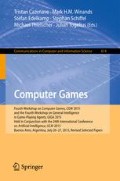Abstract
Many real-world systems can be represented as formal state transition systems. The modeling process, in other words the process of constructing these systems, is a time-consuming and error-prone activity. In order to counter these difficulties, efforts have been made in various communities to learn the models from input data. One learning approach is to learn models from example transition sequences. Learning state transition systems from example transition sequences is helpful in many situations. For example, where no formal description of a transition system already exists, or when wishing to translate between different formalisms.
In this work, we study the problem of learning formal models of the rules of board games, using as input only example sequences of the moves made in playing those games. Our work is distinguished from previous work in this area in that we learn the interactions between the pieces in the games. We supplement a previous game rule acquisition system by allowing pieces to be added and removed from the board during play, and using a planning domain model acquisition system to encode the relationships between the pieces that interact during a move.
Access this chapter
Tax calculation will be finalised at checkout
Purchases are for personal use only
References
Aarts, F., De Ruiter, J., Poll, E.: Formal models of bank cards for free. In: 2013 IEEE Sixth International Conference on Software Testing, Verification and Validation Workshops, pp. 461–468. IEEE (2013)
Bessiere, C., Coletta, R., Daoudi, A., Lazaar, N., Mechqrane, Y., Bouyakhf, E.H.: Boosting constraint acquisition via generalization queries. In: ECAI, pp. 99–104 (2014)
Björnsson, Y.: Learning rules of simplified boardgames by observing. In: ECAI, pp. 175–180 (2012)
Cresswell, S., McCluskey, T., West, M.: Acquiring planning domain models using LOCM. Knowl. Eng. Rev. 28(2), 195–213 (2013)
Cresswell, S., Gregory, P.: Generalised domain model acquisition from action traces. In: International Conference on Automated Planning and Scheduling, pp. 42–49 (2011)
Cresswell, S., McCluskey, T.L., West, M.M.: Acquisition of object-centred domain models from planning examples. In: Gerevini, A., Howe, A.E., Cesta, A., Refanidis, I. (eds.) ICAPS. AAAI (2009)
Genesereth, M.R., Love, N., Pell, B.: General game playing: overview of the AAAI competition. AI Mag. 26(2), 62–72 (2005)
Gregory, P., Cresswell, S.: Domain model acquisition in the presence of static relations in the LOP system. In: International Conference on Automated Planning and Scheduling, pp. 97–105 (2015)
Hausknecht, M.J., Lehman, J., Miikkulainen, R., Stone, P.: A neuroevolution approach to general atari game playing. IEEE Trans. Comput. Intell. AI Games 6(4), 355–366 (2014)
Kaiser, L.: Learning games from videos guided by descriptive complexity. In: Hoffmann, J., Selman, B. (eds.) Proceedings of the Twenty-Sixth AAAI Conference on Artificial Intelligence, Toronto, Ontario, Canada, 22–26 July 2012, pp. 963–970. AAAI Press (2012)
Kirk, J.R., Laird, J.: Interactive task learning for simple games. In: Advances in Cognitive Systems, pp. 11–28. AAAI Press (2013)
Love, N., Hinrichs, T., Genesereth, M.: General game playing: game description language specification. Technical report, Stanford University, 4 April 2006. http://games.stanford.edu/
McCluskey, T.L., Cresswell, S.N., Richardson, N.E., West, M.M.: Automated acquisition of action knowledge. In: International Conference on Agents and Artificial Intelligence (ICAART), pp. 93–100 (2009)
McCluskey, T.L., Porteous, J.: Engineering and compiling planning domain models to promote validity and efficiency. Artif. Intell. 95(1), 1–65 (1997)
Muggleton, S., Paes, A., Santos Costa, V., Zaverucha, G.: Chess revision: acquiring the rules of chess variants through FOL theory revision from examples. In: De Raedt, L. (ed.) ILP 2009. LNCS, vol. 5989, pp. 123–130. Springer, Heidelberg (2010)
O’Sullivan, B.: Automated modelling and solving in constraint programming. In: AAAI, pp. 1493–1497 (2010)
Richardson, N.E.: An operator induction tool supporting knowledge engineering in planning. Ph.D. thesis, School of Computing and Engineering, University of Huddersfield, UK (2008)
Schaul, T.: A video game description language for model-based or interactive learning. In: Proceedings of the IEEE Conference on Computational Intelligence in Games (CIG 2013), pp. 193–200. IEEE (2013)
Wu, K., Yang, Q., Jiang, Y.: ARMS: an automatic knowledge engineering tool for learning action models for AI planning. Knowl. Eng. Rev. 22(2), 135–152 (2007)
Zhuo, H.H., Yang, Q., Hu, D.H., Li, L.: Learning complex action models with quantifiers and logical implications. Artif. Intell. 174, 1540–1569 (2010)
Author information
Authors and Affiliations
Corresponding author
Editor information
Editors and Affiliations
Rights and permissions
Copyright information
© 2016 Springer International Publishing Switzerland
About this paper
Cite this paper
Gregory, P., Schumann, H.C., Björnsson, Y., Schiffel, S. (2016). The GRL System: Learning Board Game Rules with Piece-Move Interactions. In: Cazenave, T., Winands, M., Edelkamp, S., Schiffel, S., Thielscher, M., Togelius, J. (eds) Computer Games. CGW GIGA 2015 2015. Communications in Computer and Information Science, vol 614. Springer, Cham. https://doi.org/10.1007/978-3-319-39402-2_10
Download citation
DOI: https://doi.org/10.1007/978-3-319-39402-2_10
Published:
Publisher Name: Springer, Cham
Print ISBN: 978-3-319-39401-5
Online ISBN: 978-3-319-39402-2
eBook Packages: Computer ScienceComputer Science (R0)

